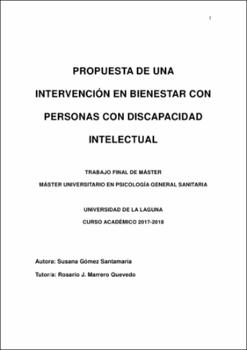Propuesta de una intervención en bienestar con personas con discapacidad intelectual
Autor
Gómez Santamaría, SusanaFecha
2018Resumen
The objective of this work was to analyze the effectiveness of a positive
intervention program to promote the hedonic and eudaimonic well-being of
4
women with intellectual disabilities. The participants were eleven women
(average 34.27 years). A non-random assignment of the participants to the
intervention condition (n = 6) and to the control condition, without treatment (n =
5) was carried out. Participants were evaluated before and after the intervention
to test the effectiveness of the treatment program. The INICO-FEAPS quality of
life scale, the ABC-ECA scale of behavioral problems and the EZPQ personality
test were administered to third parties, while the participants completed the
quality of life scale and the Pemberton welfare index. Likewise, a qualitative
interview and observational records were conducted. The results indicated that
there were hardly any significant changes in the quantitative measures after the
intervention, although the qualitative data indicated that the program had been
satisfactory, giving the participants greater analytical capacity. Third-party
reports indicated increases in self-determination, emotional well-being and
interpersonal relationships. This work allows establishing future lines of work aimed at improving the well-being of this population. El objetivo de este trabajo fue analizar la eficacia de un programa de
intervención positiva para promover el bienestar hedónico y eudaimónico de
mujeres con discapacidad intelectual. Los participantes fueron once mujeres
(media 34,27 años). Se llevó a cabo una asignación no aleatoria de las
participantes a la condición de intervención (n = 6) y a la condición de control,
sin tratamiento (n = 5). Las participantes fueron evaluadas antes y después de
la intervención para probar la efectividad del programa de tratamiento. Se
administraron la escala INICO-FEAPS de calidad de vida, la escala ABC-ECA
de problemas de conducta y la prueba EZPQ de personalidad a terceras
personas, mientras que las participantes cumplimentaron la escala de calidad
de vida y el índice Pemberton de bienestar. Así mismo, se realizó una
entrevista cualitativa y registros observacionales. Los resultados indicaron que
apenas existían cambios significativos en las medidas cuantitativas tras la
intervención, aunque los datos cualitativos indicaron que el programa había
resultado satisfactorio dotando a las participantes de mayor capacidad de
análisis. Los informes de terceros indicaron incrementos en autodeterminación,
bienestar emocional y relaciones interpersonales. Este trabajo permite
establecer líneas de trabajo futuras destinadas a mejorar el bienestar de esta
población.




